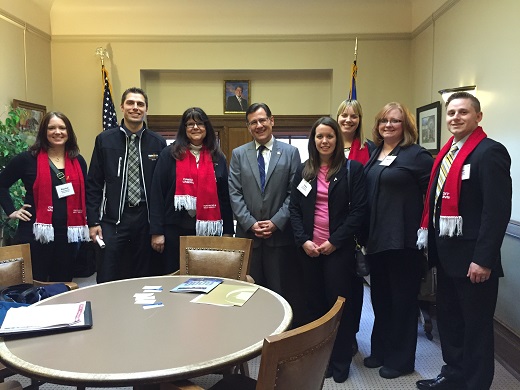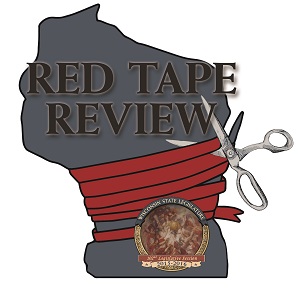
|
February 13, 2015 |
Working for you! |
|
Red Tape Review coming to Appleton |
||
|
This legislative session, the Assembly Majority is continuing
our efforts to eliminate burdensome and outdated regulations
from our state's Administrative Code. Please join us for the roll-out of our Red Tape Review, led by Rep. Joan Ballweg (R-Markesan). The first roundtable session in the statewide tour: Monday, February 16th, from 3-4pm Fox Valley Technical College Room A170, 1825 N. Bluemound Dr, Appleton Use Entrance 16 off the North parking lot I will be there, along with Rep. Mike Rohrkaste, Rep. Ballweg, Rep. Steineke, Rep. Jacque, Rep. Macco, Rep. Schraa, and Rep. Tittl to talk with citizens and business people and learn what regulations are holding you back from being your most successful. Other roundtables are scheduled next week in Pewaukee, Rothschild and Altoona. |
||
|
State Budget Process |
||
|
In a nutshell, here is the process for a budget bill to become
law in Wisconsin. At the start of each odd-numbered year, the
governor proposes a two-year budget plan. Then, the budget is
reviewed by the 16-member Joint Committee on Finance, which
first holds informational briefings with state agency heads to
discuss their budget requests, then holds several public
hearings around the state. After the public hearings, the Committee spends several weeks voting on each individual piece of the budget. The Committee takes its final vote and the budget then goes to the full Assembly and Senate. Once it passes both houses of the legislature, the bill goes back to the governor for a signature. The governor has partial veto authority that allows him to veto individual pieces of the budget before signing it into law. Wisconsin is required by statute to pass a budget. If a budget isn't passed on time, state operations continue under the terms of the previous budget until the new budget is passed. This biennium's budget bill is Senate Bill 21. You can also learn about the Joint Committee on Finance and find your way to budget motions and other information on the Joint Committee on Finance page. If you are interested in all aspects of the state's finances, you may want to check out the non-partisan Fiscal Bureau page, which features informational papers (descriptions of all state entities and their costs), budget papers, and much more pertaining to how Wisconsin funds operations. If you want a nuts and bolts primer on how this process works, I recommend using The State Budget Process publication from the Fiscal Bureau. |
||
|
University of Wisconsin System and Governor Walker's budget proposal |
||
|
The Governor's budget proposal relating to the University of Wisconsin System has received much attention over the past few weeks. Below, you can read my views on the budget in this area, thus far. I am talking regularly with higher education stakeholders on all aspects of the budget pertaining to this area. My Op-Ed submitted to the Milwaukee Journal Sentinel on January 30, 2015: The UW System: Challenges and Opportunities Moving Forward Governor Walker announced details of is 2015-2017 budget proposal that would turn the University of Wisconsin System (UW) into a public authority, extend the tuition freeze, and cut funding by $300 million. In anticipation of the governor's Biennial Budget Address on February 3rd, a dynamic conversation has already begun among policymakers, members of the UW, and citizens in the state. Great change is often met with great anxiety, but this is also a time of opportunity. The governor's plan offers a strong starting point as we begin the budget-making process in the legislature where this proposal will be scrutinized more closely as we gather feedback from the public. The goal is simple: provide tools to enhance education and increase efficiency to save taxpayer dollars. For too long, the UW was limited by volatile state budgets and onerous regulations. The UW has sought autonomy from state bureaucratic rules that are not conducive to higher education. Under a public authority model, the UW will have the ability to design their budgets and programs with consistency, which is important for an entity whose product and mission is not based on a two-year budget or election cycle. The tools given to the UW and individual campuses will create long-term opportunities to save taxpayers money. The administration, with faculty, staff and student input, should have control of their decision-making process because they know best how to run their campuses. I recognize the strain of $150 million a year in reductions and the legislature will discuss whether this is an appropriate level to cut. As with any policy discussion, unintended consequences must be avoided. For instance, we do not want to jeopardize the opportunity for UW-Milwaukee to become a top-tier research university or see a large number of staff reductions across the system. We will hear worst-case scenario reactions from the UW and other stakeholders, but I am confident that over the next few months we will have healthy debates that ultimately result in a stronger UW. The tuition freeze keeps Governor Walker's promise to the taxpayers of Wisconsin, but more discussion is needed to ensure that the UW continues to prioritize accessibility for in-state students and that our students are not hit with massive tuition increases two years from now. Recruiting more nonresident students who pay twice as much tuition as resident students will be tempting. I look forward to the dialogue on how autonomy will affect tuition rates because we need to balance the needs of the UW with the needs of the students and the hardworking families who pay for a college education. As Chair of the Assembly Committee on Colleges and Universities, my vision going forward is the following: maintain the high quality of a Wisconsin education, mitigate potentially large tuition increases in 2017, preserve in-state accessibility, and empower the Board of Regents and individual campuses so they will be responsive and adaptable to evolving needs. Population trends indicate a smaller pool of incoming students, and an efficient UW that delivers value and a competitive advantage to attract and retain talented students and faculty will be more important than ever to the future success of the UW. We all have challenges to meet and promises to keep. The UW has a rich history and long-held traditions that advance the Wisconsin Idea and we have the responsibility going forward to renew and enrich these ideals. The University of Wisconsin has been and will continue to be crucial to our state's success. In the very near future, I believe Wisconsin could have a better and stronger UW that exerts an even greater impact on every Wisconsinite. |
||
|
Credit Union Legislative Day, January 2015 |
||
|
I was happy to talk with members of our area credit unions when they visited my office for their 2015 Legislative Day. It's always great to meet with community-focused people who promote fiscal responsibility and customer service.
Thank you all for taking the time to visit! Melinda Schultz, Shonna Prickette and Tyler Sewall from Prospera Credit Union, Marie Hopfensperger and John Hessenthaler from Fox Communities Credit Union and Rachel Williams and Lisa Krause from Evergreen Credit Union. |
||
|
To unsubscribe from this newsletter, reply with "unsubscribe" in the subject line.
| Rep.Murphy@legis.wisconsin.gov | State Capitol Room 318 North - PO Box 8953, Madison, WI 537088 | Toll Free: (888) 534-0056 or (608) 266-7500 |

